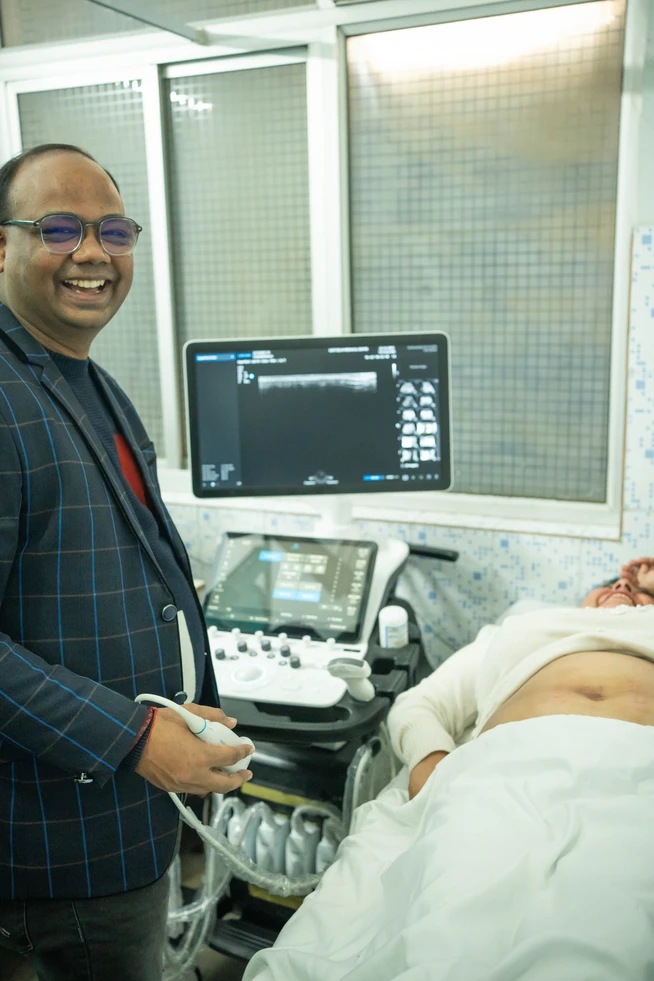Affordable Pregnancy Ultrasound near you

CGHS and ALL Major Panels Pregnancy Ultrasound near you
Accurate Diagnosis with An NABH accredited, 35 year Old Hospital and Diagnostics Centre

Latest and Best Technology
Best in class Equipment with
SAMSUNG V7 Ultrasound
Global Standard Reporting
Advanced reporting system with universally recognized standard, with reliable results tailored to your condition.
Experienced Radiologist
who brings years of expertise to interpret your scans, with meticulous analysis and accurate diagnostics
Level II ultrasound
Ensure the well being of your young one during pregnancy with Level II Ultrasound
Rapid Results, Reliable Diagnoses
Convenience of swift ultrasound tests without compromising on accuracy and reliability!
35 Years of Trust
5 Lakh + Happy Patients over three decades speak for us!

Obstetric Ultrasound
Obstetric ultrasound is essential for monitoring fetal growth, ensuring proper development, and detecting any abnormalities early in pregnancy, providing crucial information for prenatal care. Scans like Level ii scan are instrumental during pregnancy and we ensure you get the most comprehensive results.
Provides detailed anatomical assessment of the fetus, often performed around 18-22 weeks of pregnancy.
Screens for chromosomal abnormalities, such as Down syndrome, in early pregnancy.
Utilized during pregnancy to monitor fetal growth, position, and well-being.
Assesses fetal health by evaluating fetal movements, muscle tone, breathing, and amniotic fluid levels.
Ultrasounds during pregnancy : A window into the future
Along with the Joy of welcoming a new member of the family comes the worry of about the little one’s health! Pregnancy is a miraculous journey, and ultrasound tests play a crucial role in monitoring the health and development of the growing baby. Pregnancy Ultrasound Tests give an insight to the baby’s condition and warn of any anomalies that may come. East Delhi Medical Centre wants to welcome all mothers for this important step, we want to ensure that you can get a complete assessment of the baby’s health and rule out any congenital (present from birth) conditions.
These non-invasive imaging techniques provide Doctors with a comprehensive view of the fetus, let’s understand the Major Scans associated with expecting mothers.
Obstetrics Ultrasound
Throughout the nine months of pregnancy, Obstetric ultrasound serves as a trusted test, guiding both parents and us healthcare professionals to keep track of the pregnancy and ensure the well being of mother and child.
Obstetric ultrasound is a non-invasive, painless diagnostic imaging scan that uses high-frequency sound waves to create detailed images of the developing fetus during pregnancy. This scan is now an unavoidable part of contemporary prenatal care, providing Doctors with a wealth of crucial information about the unborn child’s growth, development, and overall well-being.
- Fetal anatomy: Obstetric ultrasound provides a detailed evaluation of the fetus’s anatomical structures, such as the brain, heart, lungs, and limbs, enabling the early detection of potential congenital abnormalities or malformations.
- Fetal growth: With precise measurements of the fetus during various stages of pregnancy, we can monitor the baby’s growth rate and ensure that it falls within expected parameters.
- Placental examination: The placenta, which serves as the lifeline between the mother and the developing fetus, can be thoroughly examined using obstetric ultrasound, allowing for the identification of any placental abnormalities or complications.
- Amniotic fluid assessment: The amount and quality of the amniotic fluid surrounding the fetus can be evaluated through obstetric ultrasound, as abnormal levels may indicate potential complications.
The test has to be done in consultation with you gynecologist. Additionally, Obstetric Ultrasound or (OBS USG) is a also a general term used as an umbrella term for other pregnancy related ultrasound scans, we need not confuse it to be exclusive to level 2 scans which are done in the later stages of pregnancy.
Nuchal Translucency Scan
At around 11 to 13 weeks of gestation, expectant mothers may undergo a “nuchal translucency scan” or a “12-week sonogram.” Popularly known as NT Scan, this is a specialized ultrasound which measures the amount of fluid accumulation at the back of the Baby’s neck during the first trimester of pregnancy. A small amount of fluid is perfectly normal, an increased measurement can potentially indicate the presence of chromosomal or genetic conditions. The tests have to be done in consultation with your gynecologist.
When we combine the results of the NT scan with blood tests, we can obtain a more accurate assessment of your baby’s risk for congenital conditions. This comprehensive approach, known as the “first-trimester screening” or “combined sequential screening,” empowers us to make well-informed decisions about further testing or monitoring.
Level 2 Scan (Level II Sonogram) or Anomaly Scan
One of the most important ultrasound scans during pregnancy is the Anomaly Scan, known as the level 2 ultrasound or level ii sonogram. Level 2 Scan is a comprehensive examination which is usually performed between 18 and 22 weeks. At EDMC too, Level 2 scan is the most requested scan among our patients.
The objective of the level 2 ultrasound is to evaluate and understand anatomical details of the developing fetus, placenta, and maternal pelvic organs. This scan detects potential congenital malformations, fetal growth abnormalities, and placental pathologies, enabling us to provide the best possible care for both mother and child. Baby’s anatomy, including the brain, heart, kidneys, and other vital organs, get a complete assessment to detect any potential structural abnormalities or birth defects.
Biophysical Profile
The biophysical profile (BPP) is a comprehensive prenatal test done in the last trimester of pregnancy- It may be done after 24 weeks, but is usually done after 28 or 32 weeks. It is used to assess fetal well-being, particularly in high-risk pregnancies or when complications are suspected. This non-invasive evaluation combines ultrasound imaging and fetal heart rate monitoring to evaluate five key parameters
Areas of Assessment by the scan
- Fetus’ Muscle tone: The fetus opening/Closing its hands or bending and extending its arms or legs.
- Baby’s Body movement – Fetus moving its body or Limbs
- Breathing movements: Presence of continuous, rhythmic breathing.
- Amniotic fluid volume: Volume of Amniotic Fluid in fetus in amniotic fluid pocket
Let's Understand Ultrasound Tests!
What is an ultrasound?
Ultrasound Test is a medical test that uses high-frequency sound waves to create images of the inside of the body. It helps doctors see organs, tissues, and structures in real time and helps in diagnosing various issues in body.
How does an ultrasound work?
During an ultrasound, a small device called a transducer sends sound waves into the body. These waves bounce off organs and tissues, creating echoes. The transducer picks up these echoes and turns them into images on a screen.
Which diagnostic Tests can I get done at EDMC?
We are one of the best and most trusted diagnostic centers of East Delhi! For Urology we offer imaging studies (such as ultrasound and CT scans), urine tests, cystoscopy, urodynamic testing, and prostate-specific antigen (PSA) testing. These help us accurately diagnose and develop personalized treatment plans.
Do I need to prepare for an ultrasound?
Preparation for an ultrasound depends on the type of exam. For some, you might need to fast for a few hours, while for others, you might need to drink water and have a full bladder. Your healthcare provider will give you specific instructions.
Who performs ultrasounds?
Ultrasounds are typically performed by trained technologists or sonographers who specialize in using ultrasound equipment to create images. Doctors then interpret these images to make diagnoses.
Why are ultrasounds used?
Ultrasounds are used for various reasons, like checking the growth of a baby during pregnancy, examining organs like the heart, liver, or kidneys, detecting abnormalities, guiding medical procedures, and more.
Are ultrasounds safe?
Yes, ultrasounds are considered safe because they use sound waves instead of radiation. There are no known risks to the patient during a standard ultrasound procedure.
Do ultrasounds hurt?
No, ultrasounds are painless. You may feel some pressure from the transducer as it’s moved over your skin, but it’s not uncomfortable.
Are there different types of ultrasounds?
Yes, there are different types of ultrasounds based on the area of the body being examined. For instance, there are abdominal ultrasounds, pelvic ultrasounds, fetal ultrasounds during pregnancy, and more.
How long does an ultrasound take?
The duration of an ultrasound can vary depending on the type of exam and what’s being examined. Generally, an ultrasound takes between 20 to 60 minutes.
Hear from our patients



